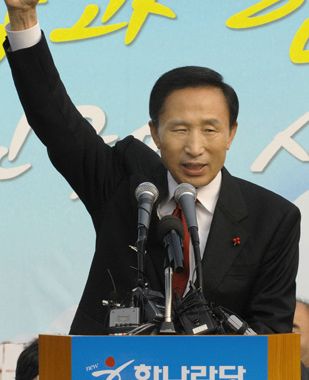Victory by the conservative Grand National party candidate ends a decade of liberal rule in which the government pursued a “sunshine” policy of engaging the North and largely refraining from criticising its human rights record.
Lee said economic and humanitarian assistance to Pyongyang would depend on progress in denuclearisation and the country’s human rights record.
The North this year began disabling its main nuclear facility under watch of US experts to comply with an international accord – the first time Pyongyang has scaled back its development of atomic weapons.
Denuclearisation
Lee stressed the North must abandon its nuclear weapons programme to develop its stagnant economy.
“The most important thing is for North Korea to get rid of its nuclear weapons,” he said, calling for co-operation with other countries at international arms talks.
Lee, a former Hyundai CEO and Seoul mayor, also said the divided Koreas can open a new era of co-operation if the North ends its nuclear development.
“The road toward peace through coexistence is the road to guarantee a peaceful reunification,” he said.
“Full-fledged economic exchanges can start after North Korea dismantles its nuclear weapons.”
On relations with the US, Lee said he would “renew the common values and peace based on trust”.
Lee won 48.7 per cent of the vote on Wednesday, with his closest rival, liberal Chung Dong-young, well behind at 26.1 per cent.
The margin of victory was by far the largest in any South Korean presidential election.
Voters apparently wanted change and a boost to the economy so badly that they were willing to overlook accusations of ethical lapses that dogged Lee throughout his campaign.
Fraud probe
Just days before the election, parliament approved an independent counsel investigation into alleged stock manipulation by Lee that is to be completed around the time of his scheduled inauguration on February 25.
|
|
Born on December 19, 1941 in Japan
Returned to Korea shortly after Japan‘s 1945 wartime defeat
Rose from poverty that gripped peninsula after Korean War
Worked as cleaner to put himself through college
Became youngest chief executive of Hyundai Group construction arm at 37, earning nickname “The Bulldozer”
Entered parliament in 1992 but quit in 1998 after overspending campaign funds
Elected mayor of Seoul in 2002, driving through huge project to open up scenic stream through heart of capital, earning him environmental credibility
Has declared assets of $38m and has pledged to give poor most of fortune
|
He has said he will step down if found at fault, but there is pressure now for the government to drop the investigation.
Kang Jae-sup, the chairman of Lee’s Grand National party, on Thursday asked Roh Moo-hyun, the incumbent president, to veto the independent counsel bill to allow for a smooth transition of power.
But a presidential spokesman said Roh had already expressed his intention to sign the investigation bill.
Lee, who turned 66 on election day, earned his victory on a wave of discontent over Roh’s perceived mishandling of the economy.
Lee pledged to put the economy first once he takes office.
“I’ll create an environment where businesses will feel confident in making investments,” Lee said.
“The atmosphere was anti-business and anti-corporate so that companies were reluctant to invest,” he said of the last 10 years of South Korean government, adding that his government would actively court foreign investment.
His win on Wednesday gave an immediate fillip to local shares prices, especially construction and finance firms which are seen as early beneficiaries of his conservative presidency.
His more conservative administration plans to cut taxes, scale back public spending, and, in a more creative move, build a giant canal that would cut across the country.
Lee says the “Grand Canal” linking Seoul to the southern port city of Busan would improve transportation, be a tourist attraction and create jobs.

